|
18 And Jesus came and said to them, “All authority in heaven and on earth has been given to me. 19 Go therefore and make disciples of all nations, baptizing them in[b] the name of the Father and of the Son and of the Holy Spirit, 20 teaching them to observe all that I have commanded you. And behold, I am with you always, to the end of the age.” Matthew 28:18-20 -Kristy Burmeister- When I was sixteen years old, I stood behind my father’s pulpit one Sunday morning and passionately spoke about evangelizing our community. There were people, right in our Bible belt, who hadn’t been brought into the church yet. People who thought churches wouldn’t want them. People who thought God wouldn’t want them. I got a lot of “Amens” that morning, and when I got even more fired up, I said, “Who here wants to take this town for God?” I got an absolute chorus of “Amen” and “Yes” and “That’s right”. “Great,” I said, “What’re we going to do about it?” And then there was silence and awkward stares that said, “What? We have to do something? We’re already doing something—sitting in a pew is doing something.” Christians really like the idea of evangelizing and reaching out to people, but most of them would prefer it if the Holy Spirit would handle all that without any input from them. 19 For though I am free from all, I have made myself a servant to all, that I might win more of them. 20 To the Jews I became as a Jew, in order to win Jews. To those under the law I became as one under the law (though not being myself under the law) that I might win those under the law. 21 To those outside the law I became as one outside the law (not being outside the law of God but under the law of Christ) that I might win those outside the law. 22 To the weak I became weak, that I might win the weak. I have become all things to all people, that by all means I might save some. 23 I do it all for the sake of the gospel, that I may share with them in its blessings. 1 Corinthians 9:19-23 When Paul began his ministry, he did things a little differently. He reached out to Gentiles and he didn’t insist on strict adherence to Jewish law. He was doing something new and not everyone in the early church “got it”. I have become all things to all people, that by all means I might save some. I do it all for the sake of the gospel…” What’s happening with Fig Tree is different too. And that’s the point. If Paul were alive today, he might write something like, “To the disillusioned people who hide on the internet because traditional churches freak them out, I have become Fig Tree Christian…” I was one of the first people to sign on when Fig Tree opened up for membership. Filling out that form was a big step for me. It’d been more than 15 years since I’d been active in a church. About two years ago, I came across a link to one of the Meditations on Fig Tree. Over the next few months, I kept coming back to read and got to know Rev. Melissa. Here’s the thing about me. Christians scare me. Put me in a locked room with Dracula, and I’d just stand there making fang jokes. But put me in a room with a nice, upstanding Christian dude and I’d be clawing at the door until my fingers bled. 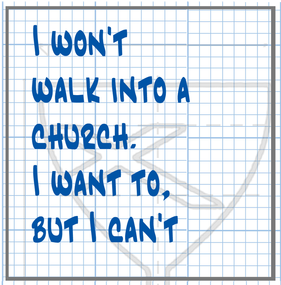 I won’t walk into a church. I want to, but I can’t. I was so traumatized by my old church that sometimes I actually have panic attacks when I try to attend a new church. I don’t know if the Christians sitting in the pews around me are safe people or not. What I will do is hop on Facebook and participate in Fig Tree’s Live feed. I’ll participate in online Bible studies. I’ll read the Meditations. And I don’t even have the language to describe what a huge step doing that is for me. I’m far from alone. A while back, I started sharing my own experiences on my blog and on reddit. I was overwhelmed by some of the responses I got. So many people out there have been hurt or traumatized, not by individual people who happen to be Christians, but by entire groups of Christians within a church. And do you know where we tend to go after that happens? Well, not back into a church building. (Most people aren’t going to touch a stove after it’s already burned them.) We’re online, because who isn’t on the internet these days? Fig Tree is a safe place for all of us online church orphans. But there’s a second step that needs to happen. Fig Tree is in its first month of meeting as a physical church, offline. The whole thing is streamed live on Facebook so people like me can participate. Now, I live way up in Michigan and Fig Tree is meeting way down in Georgia. If I lived in Georgia, I would feel comfortable enough to attend a physical church there. And that’s exactly what hurting people in that area need. A safe church. Because there are tons of people in that area who need to know they are wanted by a church and by God. If you live in the area, I encourage… no. Scratch that. I beg you, on behalf of all the people like me who’ve been stomped on by people who claimed to follow Christ and desperately want to be part of a church that won’t do that again, stop in for a worship or two while Fig Tree is meeting. See what Rev. Melissa is doing. Understand that there is a vision there and there is a reason for doing things a little differently. Go and support what we’re doing there. Show us that you care about the people who can’t come to the traditional Sunday morning worships. What Fig Tree is doing is new and it’s needed. And isn’t that what we’re called to do? Go and make disciples. So, go. Kristy is an ex-Mennonite adult PK who blogs about life, active pacifism, and wandering through the spiritual wilderness at kristyburmeister.com while consuming ridiculous amounts of coffee and pie. Wanna connect with others? Join Fig Tree on:
Facebook (We live cast the event every Saturday at 2pm EST, for those who wish to participate.) Our Subreddit 24 Then Jesus said to his disciples, “All who want to come after me must say no to themselves, take up their cross, and follow me. 25 All who want to save their lives will lose them. But all who lose their lives because of me will find them. 26 Why would people gain the whole world but lose their lives? What will people give in exchange for their lives? 27 For the Human One is about to come with the majesty of his Father with his angels. And then he will repay each one for what that person has done. 28 I assure you that some standing here won’t die before they see the Human One coming in his kingdom.” Matthew 16:24-28 CEB -Rev. Melissa Fain- Most of us have at least heard of Maslow’s Hierarchy of Needs: I’m not going to spend a large amount of time explaining this. Just know, the needs at the bottom are more vital than the needs at the top. We only need creativity and spontaneity when our physiological needs, safety and security, social needs, and esteem needs are met. Like, one would concern themselves with getting food, before thinking about their safety or the friends they have. Maslow's chart is important, in that, it stopped us thinking about the negatives of the human existence, and start thinking about the positives. However, there are people who push against this pyramid. I’m one of them. Growing up, I would tell my family what I wanted. They would reply, “Yes, but do you need it?” The answer was usually no. I’ve had anything but a normal childhood. After my dad and mom divorced, I lived with my mom. She married an abusive alcoholic. Many, thank God, can’t understand that kind of situation. To simplify it, I lost weight when I should have been gaining. I had to sneak into the kitchen to get anything to eat. This was usually no more than a piece of bread with sugar on it. My sister and I had many sleepless nights, as we feared for our own safety. My stepdad and mom would scream and he would threaten all our lives. When my dad won custody my grandmother and aunt were my main female influences. Both, treated me poorly. My grandmother disowned me. She took that to her grave. She would get angry at me when I asked to get something to eat. She told me I could get anything I wanted from the fridge. (She never understood our situation with our mom, and never really tried.) Needless to say, my social needs and my esteem was shot. I engaged in a form of self-mutilation through hair pulling. No one tried to physiologically help me. No one probably realized I needed help because my creativity flourished. When I lived with mom, I needed to decorate a big paper Christmas tree for a school project, I took flour and water to make a rudimentary paste, found string and cotton balls, and worked until I got those things on the tree. It wasn’t pretty, but it was decorated. This has been my go-to throughout my life. If something needs to get done, there is always a way to figure it out. It might be with paperclips and dental floss, but it can be done. It also made me second guess needs verses wants. I am physical proof, there is something not quite right with Maslow's chart. I was hungry. I was in danger. Yet, I still found a way to be creative in areas outside of my physiological needs. Maybe there's another option... I’m going to share something I haven’t heard from anyone else. This is something I’ve formulated over a lifetime of experience, and prayer. We are used to believing needs go before wants. I blame Maslow for that. I want to suggest something completely different. Wants are more important than needs. By themselves, there is absolutely nothing in this world we need. In actuality, needs are only anchored to what we want. Let me give you an example. By itself, I don’t need to live. However, if I want to take care of my children, I need to live. If I want to make a positive impact on the world, I need to live. Our life is anchored by our greatest want, not our greatest need. Many choose life as their greatest want. If a person wants to live, they need to eat, find a safe place to live, keep themselves healthy. They need those things because they want to live. Maslow’s chart presupposes that any human would choose living as their greatest want. This is actually not the case. In reality, the triangle is upside down. We have more needs, the further we move away from our greatest want. There are people who choose comfort as their greatest want. There are others who choose to care for others as their greatest want. There are those who choose fame as their greatest want. Everything is anchored to the greatest want… unless the person has an empty want. Empty wants arise when something hooks us without context to why. It has no connection to our greatest want, and therefore, no lasting purpose in our life. This happens through empty needs. Many of these empty needs take the form of things, usually sold to us in commercials and found in the impulse isle. Sometimes, empty needs are hooked with a promise that it meets our greatest want, and just sticks around once it doesn’t fulfill what it promised. (This is the real reason many Christian’s cringe at the word “branding,” but more on that another week.) Sometimes, an empty need arises when it’s tied too often to our greatest want. For example, many American commercials today promise a quick and easy way to get what we want. Our greatest want is tied into what they are promising. Like, we want to live a long healthy life. Therefore, maybe we need to lose 5-20 pounds. A new product is promising we can lose that weight quickly and easily. All of a sudden we have a secondary want sneak into our world view. We want things quickly and easily. We can all have what we want without even trying. This sounds great, and we buy into it. Only, often times our empty wants can cause us to act outside of our greatest want. Yeah, it might be quick and easy to take that diet pill, but it’s not in line with our greatest want. A diet pill is a quick fix that won’t give us a long and healthy life. It will only temporarily take the weight off. Finally getting to that bible verse I started us all on. Jesus is asking something radical. Whatever our greatest want is, replace it with God. Think about how big that is. It’s uncomfortable. How are we going to protect our life, if it’s not our greatest want? Tell me if this phrase all of a sudden makes complete sense: “If you wish to save your life, you must first lose it.”? I believe Jesus is asking us to make God our greatest want. When we do that, everything falls into place. God wants us to relate, and work with one another. God wants us to care for our family. God wants us to care for our self. We want God, and what God wants becomes what we need. I want you to work on a chart. Make life the greatest want, and work your way up. What are the essential needs if your greatest want is life? Build it up. Write down the needs to meet needs. Wanna connect with others? Join Fig Tree on:
Facebook (We live cast the event every Saturday at 2pm EST, for those who wish to participate.) Our Subreddit “Don’t even begin to think that I have come to do away with the Law and the Prophets. I haven’t come to do away with them but to fulfill them.” Matthew 5:17 CEB -Rev Melissa Fain- We must pick up the Hebrew Bible for the sake of fulfillment. It is very difficult to understand the New Testament without these early books. It must be done before we move further into our wilderness. The Ten Commandments remain a piece of the Old Testament we can easily pull into our Christian context. We can unite under these simple truths. Don’t murder. Don’t get caught up with the stuff your neighbor has. Don’t make false idols. Don’t put anything before God’s eyes… What was that? You don’t remember that commandment? It’s right there, right before the idol commandment. What we are used to reading is, “You must have no other gods before me.” (Exodus 20:3 CEB) As a child, it confused me that we separated this commandment with the nixing idols commandment. They sound exactly the same. In an important way, they are connected. Both have to do with worship. The idol commandment is about worshiping something other than God. Early on, this would be, don't go to other temples, or raise up Golden Cows, or worship Ba'al. That sort of thing. This “no other gods before me” is directly related to what we bring in to worship our God. Quite literally, we are not supposed to bring anything but our worship and adoration before God. This commandment is discussing the Holy of Holies, the Ark of the Covenant. God’s home. When we come to God’s house, we are coming only to visit God. Now, I’ll be the first to say it is difficult to understand what is adoration and worship, and what is not. Do we worship and adore God with music? If so, what kind? Do we worship and adore God with our fellowship? What about the sermon? Is it worship and adoration? When we don’t come at the Holy of Holies with particular care, almost anything could find itself in a worship, because almost anything can be justified. This is yet another reason why we are beginning with nothing. Did you know that while the general Protestant Church has been dying to oblivion, the Lutherans, Eastern Orthodox, and Catholic Church have all been growing? These traditions would tell you it’s because there earlier understanding of the Truth is the correct one. When I read or hear from those who have chosen one of these faith traditions, this is what they generally say, “It’s not that I really believe the reason why they do what they do, but they know what they do.” In other words, if you approached a Catholic Priest, after Mass, and begun asking why certain objects were in the room, he’d be able to tell you. If you were to ask an Eastern Orthodox Priest why they do each aspect of worship, he’d be able to tell you. If you asked a Protestant why they do a Call to Worship, sit during certain times, and stand at other times… I doubt the minister could even really explain why anymore. When we can no longer explain why what we are doing is worship to God, we might not be worshipping God anymore. At least, that’s what all these “nones” (The group of people who believe in God but cannot find themselves going to church) conclude. Why we do things is just, if not more, important than what we do. It was the second morning of Hope Partnership's Church revitalization and Church Planter training. Part of me was growing weary. I'd been "at it" with online ministry. I had already begun passing out cards for a physical launch that was going to fail. (Although I didn't know that at the time.) I was beginning to feel what Hope Partnership was trying to teach had little to do with what I was engaging in. My husband was home alone, for the first time, with two kids, and I was feeling homesick.
Today I can't recall if he came to sit with me, or I asked to sit with him, but Rev. Frank Sherard and I shared a table that morning. There are moments of that training that have begun to fade like a sun soaked picture. I recall that morning with far more clarity than anything else. I remember how proud he was of his wife. "She was supposed to be here instead of me. I'm here for her." Rev. Ashley Sherard, his wife, was going to plant a new church where a former church was going to close. He raved about his children, all named after the Beatles. We spent a little time on the Beetles.(My husband is a really big fan.) His love for a 60's British band, was only second to his family. He was a dad who loved his kids. He was a husband who loved his wife. I remember how we immediately connected to, what I can best describe as, the connection of creativity the church needed to find to move forward. We laughed; we cried. For the rest of the week my weariness melted away, and we spent the rest of the time joyfully anticipating the future of the church. Over the past few weeks I've read words from multiple followers and congregants as they expressed that they were the oldest supporters of Fig Tree Christian. Well, everyone, it's not you. At a breakfast table on a cold winter day in Indianapolis, I met the first supporter. He would enthusiastically become our first guest writer. He would invite his wife to help. I have been blessed through her, as we messaged one another about the struggles of new plants. She too would write for Fig Tree, and both would participate in our devotionals. Rev. Frank passed away yesterday morning. With him, he leaves behind a very talented ministerial wife, and three beautiful daughters. I cannot put into words how much he positively impacted my ministry and my life. Frank, you will be missed. I hope you are sitting in a jam season with John Lennon and George Harrison right now. You were an amazing person. Thank you for blessing me with your presence. I invite this community to raise this family in your thoughts and prayers. 1 In the beginning when God created the heavens and the earth, 2 the earth was a formless void and darkness covered the face of the deep, while a wind from God swept over the face of the waters. Genesis 1:1-2 NRSV -Rev Melissa Fain- (The plan, from here on out, is for meditations to relate to our live experience. Reading a meditation should enhance what happens Saturday at 2pm.) If you asked kid me what the scariest movie out there was, she would be thinking Critters. She'd only think it, because it was one of those movies she wasn't supposed to have seen, but did. She would say The Neverending Story. The idea of nothing frightened young me. I can still recall how terrified I was at the rockeater's speech. The rocks were there, then they were nothing. Wasn't there a hole, someone asks. No, he answers. A hole is something. This was nothing. Just trying to wrap my head around this idea scared me to my core. At the same time, I loved the movie. Bastion names the Childlike Empress at the end of the movie and brings everything back... or does he? When I was in high school, I checked out the book from the library. It was a German novel by Michael Ende. (Translated into English. Don't any of you think I'm a German scholar.) At the time I enjoyed reading books after I saw their movie adaptations. I liked to imagine the characters had the faces I saw on screen while those same characters often did very different things than what their movie counterparts did. This gateway reading transformed me into the bookworm I am today. Anyway, imagine my amazement when the first half of the book is relatively where the first movie concludes! Yeah, the second movie kinda picks up where the first movie left off, and the third movie is the nasty leftovers no one wants to see, but I assumed the first movie was the story of the book. All this to get to the question I posed above: Did Bastion bring everything back? Um, kinda? Yes, he does bring back Falkor, and Atreyu, but he also creates new fantastic worlds. The silver city in the second movie was a new world of his creation. There are oceans and deserts that exist because he created them. Consider this: Before the "Nothing" came, there was no room for his imagination. The "Nothing" made room for the recreation that happens every time someone takes ink to paper. I guess it gets to the broader point. Who is the author of Fig Tree Christian? Yeah, I guess in a small part it's me. I've been at this for years, and continue to strive to be ministerial in my endeavors. In a small part it's the congregants, some of whom have been around for a few years now. The real answer is God. When God creates, it's from the void; the nothing. Perhaps we have our fancy notions of what it means to be in God's presence, when God just want presence. We need to put aside our desires and wants to allow God's desires and wants to flourish. We are about to start something daunting. We are going to empty ourselves out, and come to God with nothing. That's scary. I get it. If you trust me, this will be amazing, If we come with nothing, we will leave with a recreation of God's choosing. What does that look like? I have no earthly idea! That's part of the excitement. The point is, before we can begin, we must first let go. More on that on Saturday. |
Categories
All
Archives
October 2023
|


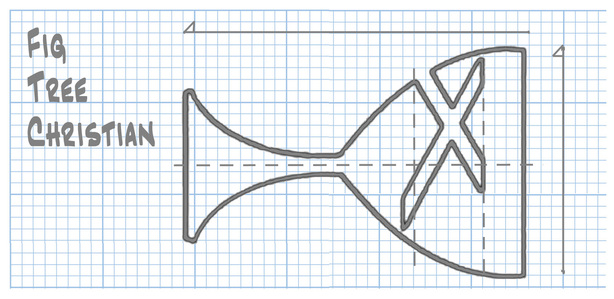
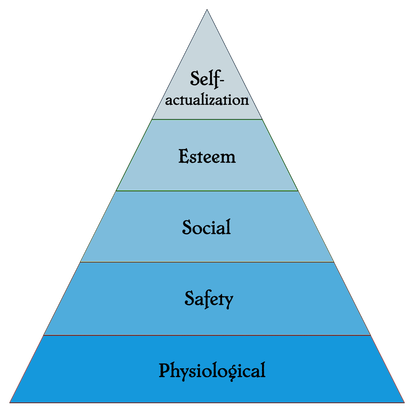
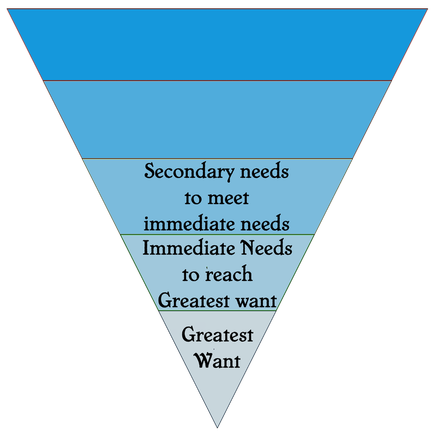

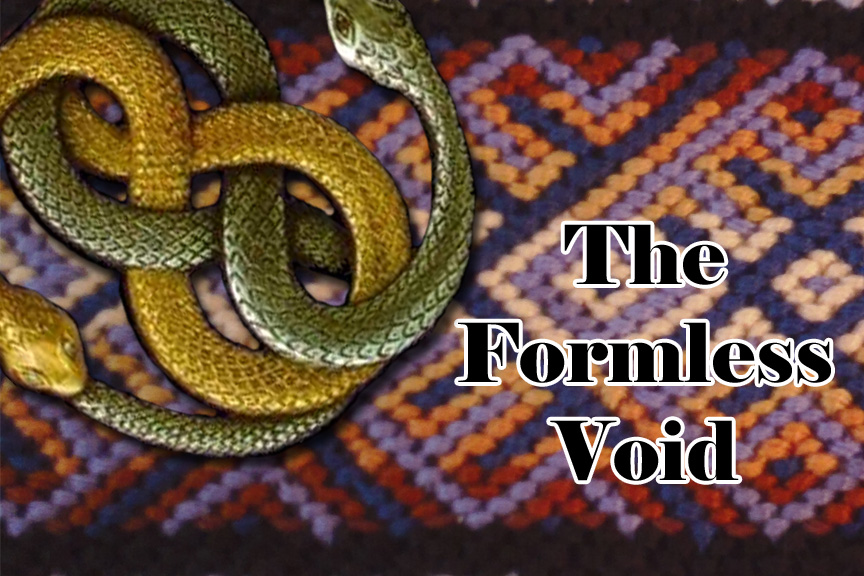

 RSS Feed
RSS Feed